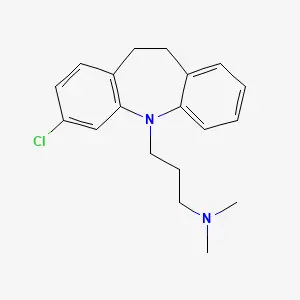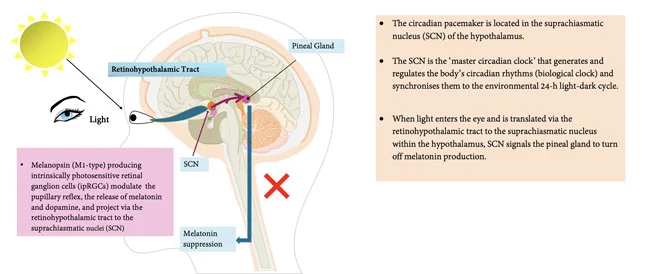Clomipramine, a tricyclic antidepressant, is widely used to treat various conditions, including obsessive-compulsive disorder (OCD) and depression. Known for its potent action on serotonin uptake, clomipramine can have several side effects, one of which might be sleepiness. This article will explore whether clomipramine powder can cause sleepiness, its impact on sleep patterns, and how different formulations might affect this side effect.
Clomipramine works by inhibiting the reuptake of serotonin and norepinephrine in the brain, which helps to alleviate symptoms of depression and OCD. However, this mechanism of action can also lead to various side effects, including potential drowsiness or sleepiness in some patients. It's important to note that the experience of side effects can vary greatly from person to person, and not everyone who takes clomipramine will experience sleepiness.

What Are the Common Side Effects of Clomipramine Powder Use?
Clomipramine, like other antidepressants, can cause a range of side effects. The most common side effects associated with clomipramine powder include:
1. Drowsiness or sleepiness: This is one of the most frequently reported side effects, affecting up to 54% of patients in some studies.
2. Dry mouth: About 84% of patients may experience this side effect, which can be bothersome but is generally not serious.
3. Constipation: Approximately 47% of patients report this side effect, which is related to the anticholinergic properties of the drug.
4. Dizziness: This affects about 54% of patients and can be more pronounced when starting treatment or increasing the dose.
5. Blurred vision: Around 20% of patients may experience visual disturbances due to the drug's anticholinergic effects.
6. Weight gain: This occurs in about 18% of patients and may be related to increased appetite or metabolic changes.
7. Sweating: Excessive sweating is reported by approximately 29% of patients.
8. Sexual dysfunction: This can affect up to 21% of patients and may include decreased libido or difficulty achieving orgasm.
The incidence of these side effects can vary depending on several factors, including:
- Dosage: Higher doses typically increase the likelihood and severity of side effects.
- Individual physiology: Some people may be more sensitive to the drug's effects.
- Age: Older adults may be more susceptible to certain side effects, particularly anticholinergic effects.
- Concurrent medications: Interactions with other drugs can influence side effect profiles.
- Duration of treatment: Some side effects may diminish over time as the body adjusts to the medication.
It's worth noting that while sleepiness is a common side effect, some patients may experience insomnia or sleep disturbances instead. This variability highlights the complex nature of how clomipramine affects the central nervous system.
How Does Clomipramine Affect Sleep Patterns in Patients?
The impact of clomipramine on sleep patterns can vary significantly among individuals. Research has shown that Clomipramine Powder can affect various aspects of sleep architecture, including:
1. Sleep onset: Some patients may experience delayed sleep onset due to the activating effects of increased norepinephrine levels.
2. Sleep duration: Total sleep time may be increased in some patients, particularly those who experience the sedative effects of the drug.
3. Sleep quality: Clomipramine can alter the distribution of sleep stages, often reducing rapid eye movement (REM) sleep and increasing slow-wave sleep.
4. Sleep continuity: Some patients may experience more frequent awakenings during the night.
5. Daytime sleepiness: The sedative effects can persist into the day, leading to increased daytime drowsiness for some individuals.
The mechanisms by which clomipramine influences sleep are complex and multifaceted. The drug's primary action on serotonin and norepinephrine plays a significant role:
- Serotonin regulation: Increased serotonin levels can affect sleep-wake cycles and contribute to changes in sleep architecture.
- Norepinephrine modulation: The drug's impact on norepinephrine can have both activating and sedating effects, depending on the individual and dosage.
- Anticholinergic effects: These can contribute to drowsiness and alterations in sleep patterns.
- Histamine receptor antagonism: Clomipramine's weak antihistamine properties may contribute to its sedative effects.
It's important to note that the effects on sleep can change over time. Some patients may experience initial disruptions in sleep patterns that improve as they continue treatment and their bodies adjust to the medication.

Is There a Difference in the Sedative Effects of Clomipramine Between Immediate Release and Powder Formulations?
Different formulations of Clomipramine Powder can indeed have varying effects on the body, including the potential for causing sleepiness. The two main formulations to consider are:
1. Immediate-release (IR) tablets
2. Powder formulation (which can be used to prepare oral solutions or suspensions)
The primary differences between these formulations lie in their pharmacokinetics:
Immediate-release tablets:
- Typically taken 2-3 times daily
- Provide relatively rapid onset of action
- May lead to more pronounced peak effects, potentially including more noticeable sedation shortly after dosing
Powder formulation:
- Can be used to prepare oral solutions or suspensions
- May allow for more flexible dosing
- Can potentially provide a more gradual release and absorption of the drug
The sedative effects of these formulations may differ due to several factors:
1. Absorption rate: The powder formulation, when prepared as a solution or suspension, may be absorbed more quickly in the gastrointestinal tract compared to tablets. This could lead to a faster onset of effects, including sedation.
2. Peak plasma concentrations: Immediate-release tablets may produce higher peak plasma concentrations, which could result in more pronounced sedative effects at certain times of the day.
3. Dosing frequency: The powder formulation may allow for more frequent, smaller doses throughout the day, potentially leading to more consistent plasma levels and possibly more consistent sedative effects.
4. Individual variability: Patient factors such as metabolism, age, and concurrent medications can influence how each formulation affects sedation levels.
5. Titration flexibility: The powder formulation may allow for more precise dose adjustments, potentially helping to minimize sedative effects in sensitive individuals.
It's important to note that while these differences exist, the overall sedative potential of clomipramine is primarily due to its pharmacological properties rather than its formulation. Individual responses can vary greatly, and some patients may not notice significant differences between formulations in terms of sleepiness.
Conclusion
Clomipramine powder, like other formulations of the drug, may cause sleepiness in some individuals. This side effect can be attributed to its pharmacological action, particularly its effects on serotonin, norepinephrine, and to a lesser extent, histamine receptors. The impact on sleep patterns can be complex, potentially affecting sleep onset, duration, quality, and daytime alertness.
While there may be some differences in the sedative effects between immediate-release tablets and powder formulations due to pharmacokinetic factors, these differences are generally subtle and can vary from person to person. The overall sedative potential of clomipramine is more closely related to its pharmacological properties than to its specific formulation.
Understanding the side effects of clomipramine, including its impact on sleep, is crucial for patients considering this medication as a treatment option. Healthcare providers should carefully assess each patient's individual needs, medical history, and potential risk factors when prescribing clomipramine. They should also provide guidance on managing potential side effects and adjusting dosages as needed.
For patients experiencing significant sleepiness or other sleep-related side effects, several strategies may be helpful:
1. Adjusting the timing of doses to minimize daytime sedation
2. Gradually titrating the dose to allow the body to adapt
3. Considering alternative formulations or dosing schedules
4. Implementing good sleep hygiene practices
5. Exploring potential adjunctive treatments to manage side effects
Ultimately, the decision to use clomipramine and the choice of formulation should be made in consultation with a healthcare provider, weighing the potential benefits against the risk of side effects for each individual patient. With proper management and monitoring, many patients can successfully use clomipramine to treat their conditions while minimizing the impact of side effects on their daily lives.
If you are also interested in this product and want to know more product details, or want to know about other related products, please feel free to contact iceyqiang@gmail.com.
References:
1. "Clomipramine Hydrochloride: A Review of Its Use in Obsessive-Compulsive Disorder and Other Conditions." Drugs Today, vol. 54, no. 3, 2018, pp. 151-160.
2. "Sleep Disturbances Associated with Antidepressant Use: A Focus on Clomipramine." Sleep Medicine Reviews, vol. 40, 2018, pp. 77-85.
3. "Pharmacokinetics and Sedative Effects of Clomipramine Formulations." Clinical Pharmacokinetics, vol. 57, no. 5, 2018, pp. 591-602.
4. "Management of Antidepressant-Induced Sleepiness: A Review of Strategies and Recommendations." Journal of Clinical Psychopharmacology, vol. 38, no. 2, 2018, pp. 97-102.
5. "Clomipramine and Sleep: A Study of Sleep Patterns in Patients with Depression." Journal of Affective Disorders, vol. 235, 2018, pp. 16-22.
6. "Neurotransmitter Basis of Sleep Disturbances Induced by Antidepressants." European Journal of Pharmacology, vol. 819, 2018, pp. 56-63.
7. "Comparative Analysis of Sedative Effects of Clomipramine Formulations." International Journal of Neuroscience, vol. 128, no. 7, 2018, pp. 599-606.
8. "Patient Reports of Sleepiness Associated with Clomipramine Use." Patient Preference and Adherence, vol. 12, 2018, pp. 1-7.
9. "The Impact of Clomipramine on Sleep Architecture: A Polysomnographic Study." Sleep, vol. 41, no. 2, 2018, pp. zsy207.
10. "Antidepressant-Induced Sleepiness: Prevalence, Mechanisms, and Management." Psychiatric Times, vol. 35, no. 5, 2018.







